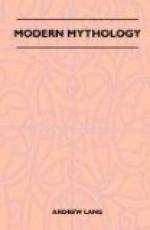CRITICISM OF FETISHISM
Mischief of Comparisons in Comparative Mythology
Not always are comparisons illuminating, it seems. Our author writes, ’It may be said—in fact, it has been said—that there can at all events be no harm in simply placing the myths and customs of savages side by side with the myths and customs of Hindus and Greeks.’ (This, in fact, is the method of the science of institutions.)
‘But experience shows that this is not so’ (i. 195). So we must not, should not, simply place the myths and customs of savages side by side with those of Hindus and Greeks. It is taboo.
Dr. Oldenberg
Now Dr. Oldenberg, it seems, uses such comparisons of savage and Aryan faiths. Dr. Oldenberg is (i. 209) one of several ’very thoughtful scholars’ who do so, who break Mr. Max Muller’s prohibition. Yet (ii. 220) ‘no true scholar would accept any comparison’ between savage fables and the folklore of Homer and the Vedas ’as really authoritative until fully demonstrated on both sides.’ Well, it is ’fully demonstrated,’ or ‘a very thoughtful scholar’ (like Dr. Oldenberg) would not accept it. Or it is not demonstrated, and then Dr. Oldenberg, though ‘a very thoughtful,’ is not ‘a true scholar.’
Comparisons, when odious
Once more, Mr. Max Muller deprecates the making of comparisons between savage and Vedic myths (i. 210), and then (i. 220) he deprecates the acceptance of these very comparisons ’as really authoritative until fully demonstrated.’ Now, how is the validity of the comparisons to be ‘fully demonstrated’ if we are forbidden to make them at all, because to do so is to ‘obscure’ the Veda ‘by light from the Dark Continent’?
A Question of Logic
I am not writing ‘quips and cranks;’ I am dealing quite gravely with the author’s processes of reasoning. ‘No true scholar’ does what ’very thoughtful scholars’ do. No comparisons of savage and Vedic myths should be made, but yet, ‘when fully demonstrated,’ ’true scholars would accept them’ (i 209, 220). How can comparisons be demonstrated before they are made? And made they must not be!
‘Scholars’
It would be useful if Mr. Max Muller were to define ‘scholar,’ ’real scholar,’ ‘true scholar,’ ‘very thoughtful scholar.’ The latter may err, and have erred—like General Councils, and like Dr. Oldenberg, who finds in the Veda ‘remnants of the wildest and rawest essence of religion,’ totemism, and the rest (i. 210). I was wont to think that ‘scholar,’ as used by our learned author, meant ‘philological mythologist,’ as distinguished from ‘not-scholar,’ that is, ‘anthropological mythologist.’ But now ‘very thoughtful scholars,’ even




